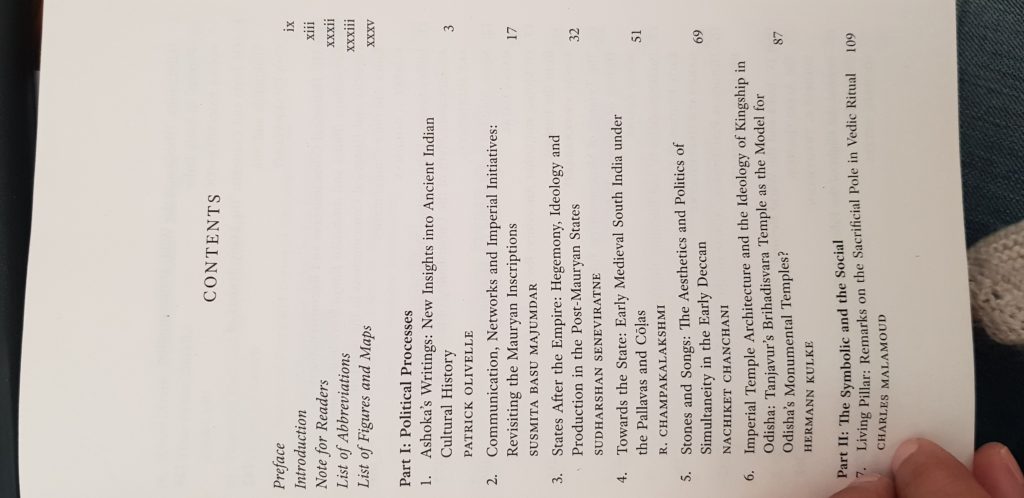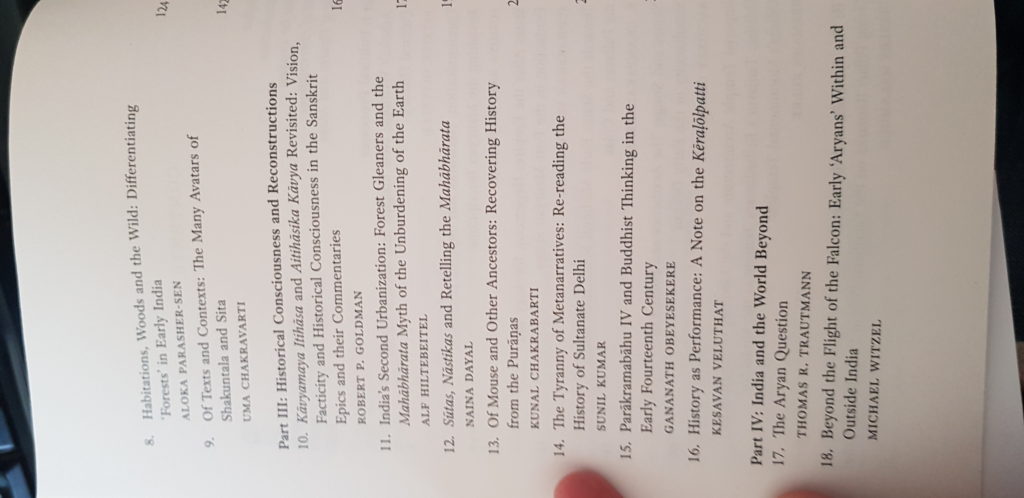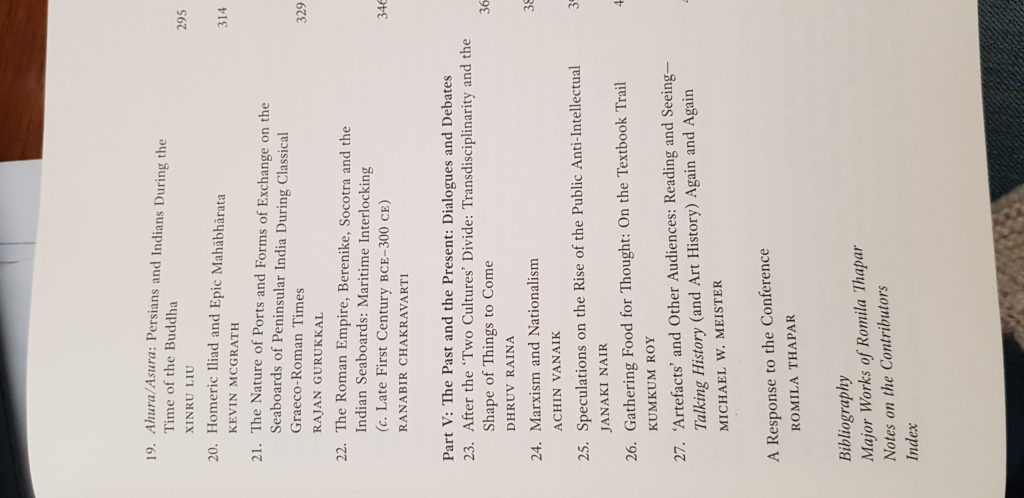“Questioning Paradigms, Constructing Histories: A Festchrift for Romila Thapar”
During the course of a long and distinguished career, historian and public intellectual, Romila Thapar has produced a unique body of work. Her original and path-breaking commentaries and essays on ancient Indian history, along with her incisive writings on culture, society, archaeology, philosophy, classical literature and education have inspired a growing number of historians, scholars, public intellectuals and ordinary people alike. In this Festschrift, Romila Thapar’s students and colleagues from across the world celebrate her contributions by applying her methods and insights to a range of historical, philosophical, sociological and cultural questions. Questioning Paradigms, Constructing Histories aims to bring Romila Thapar and her pioneering work to the attention of a wider audience.
According to Romila Thapar: ‘…an enquiry should begin with a question… The question may be something quite simple, the answer to which will further qualify what you are saying. Or it may be a question that gives you the possibility of looking at the event or the person in history from different points of view. And that one question then leads to other questions that reflect these different points of view. So I would say that the fundamental approach to any piece of research or what one is working on grows out of a question.’
The book is divided into five parts—‘Political Processes’, ‘The Symbolic and the Social’, ‘Historical Consciousness and Reconstructions’, ‘Looking Beyond India’, ‘The Past and the Present: Dialogues and Debates’. Each part focuses on a theme that Romila Thapar has worked on and topics that she has returned to time and again. Together, they showcase her exceptional achievements as one among the best historians of our time.
There is plenty in this book to mull over. It is impossible to do justice to this magnificent volume of essays. Here is an extract from Prof. Thapar’s response to the essays included in the book. This particular section is her comment on creating history textbooks for school students. In this essay from which the extract is taken Prof. Thapar reiterates that it does not matter how good the textbook is, it still requires the teachers to convey to the school student that the textbook is saying. It is imperative that the teacher be trained to think about the subject and brought up-to-date in their thinking otherwise they will not recognize the changes in disciplines — the paradigm shift. The teachers cannot expect their student to parrot the book to get the requisite grades. “That is not education”.
The extract from Questioning Paradigms, Constructing Histories edited by Kumkum Roy and Naina Dayal is reprinted by permission of Aleph Book Company
…I would like to say something about the textbooks that we wrote. These have been part of a controversy over textbooks during the last half-century, and it still continues. I think the point that was made in the discussion about the context in which a textbook is written is extremely pertinent. Why did I write these textbooks in 1963 and 1964? May I take five minutes and be a little autobiographical?
When I returned to Delhi from the School of Oriental and African Studies in 1961, UNESCO asked me to survey a representative sample of the major history textbooks that were being used in schools, in the territory of Delhi. I was sent a pile of about two dozen textbooks, which I went through, making careful notes on what they stated. They were absolutely appalling by any standards. I sent back my report saying that these books should be scrapped and shouldn’t be used in schools because their content was of such poor quality and in some cases quite erroneous. Unknown to me, UNESCO sent that report to the Ministry of Education. In those days, we could claim that we had that rare person, an enlightened education minister, Mr M. C. Chagla. He argued that school textbooks are absolutely fundamental and their quality has to be vetted by professionals.
So the Ministry decided that new and reliable textbooks were needed. It did the usual thing and set up a committee, which consisted of R. C. Majumdar, Bisheshwar Prasad, etc., all the doyens of Indian history of that time. I received a letter from Professor Majumdar inviting me to write the textbook on Ancient India for Class VI, i.e. for twelve-year-olds and later on Medieval India for Class VII. He would hardly have known me as my book on Ashoka had only just been published, but he probably wrote to me because I had done the report. This was followed by an official letter from the Ministry of Education. My first reaction was not to accept the invitation, arguing that I had been trained to do research, not to write textbooks for children. Then I thought about it and discussed it with friends who urged me to do it for what was then referred to as ‘a national cause’. So when I was convinced, I agreed to write them. My problem was precisely that I didn’t know how to write for children. I realized that the toughest thing in my life was going to be writing these textbooks. Why? Because you have to be on the top of the subject, you cannot talk down to children, and you cannot take any shortcuts by using jargon. You have to be absolutely clear. I was fully aware by now of the role of history in creating identities and I was concerned that the identities my textbooks would help create, should not be the narrow single-minded identities of religious, caste and linguistic nationalisms, but that there would at least be an exposure to more all-inclusive identities of nationalism in the context of secularism and democracy. This I suppose was how I interpreted what was termed ‘a national cause’. I was seeing the future of India as a continuation of the identity of the Indian as an inclusive identity that had been created in the anti-colonial movement. Its goal of independence implied the creation of a new secular society with an inclusive culture that characterized the Indian citizen.
I spent a couple of years in writing these textbooks, and trying them out on some of the children of the right age that I knew. What was it that led to this, and how was it a national cause? The intention was to explain to children that history is no longer treated as just a narrative about kings, queens, battles of the past, but it is a way of explaining that important events of the past had to be understood in terms of how and why they occurred; and also in showing that history is not fiction. History was now an attempt to understand what happened in the past—how, why and when—and explain it. Further that history was not limited to royalty or to the past of any one community, but that it concerned events in the life of the larger society, of the many communities that constituted the Indian people. The 1960s were the beginnings of social science in India, so everything that is stated to have happened had to have some modicum of explanation as to why it happened. And of course, sometimes the explanations worked and sometimes they just did not. Some children did say that it was so good not to have to memorize the dates of kings, queens and battles. But there were other reactions from the young. A few years down the line, the then youngest member of my family asked me in exasperation one day why I had written such a boring textbook.
Anyway, writing those textbooks was an attempt to reach out as mentioned in the discussion and to provide a more appropriate history. The main thing was that one was treating children as thinking beings and trying to encourage them asking questions. They have to be told that this is the way I think about it and this is what I am conveying to you. This is not something that you just learn by heart, you parrot, and you leave it at that. It must provoke you to ask questions. The syllabus was given to us—the authors of the six textbooks to be written for middle and high school—and we had problems with it, and some of us were critical of the syllabus. We were given a certain amount of leeway in this, but it became problematic when we stated that we would write history in the way we thought appropriate. This was not something that the representatives of the state were happy about. We had serious arguments with some of the individual states who wanted to add chapters on local big men to glorify them. This would have destroyed the balance of each book. I took the stand that the states were welcome to add what they wanted, since ours were said to be model textbooks, but only on condition that if any changes were made, then my name would be removed as the author of the book.
(Eds.) Kumkum Roy and Naina Dayal Questioning Paradigms Constructing Histories: A Festchrift for Romila Thapar Aleph Book Company, New Delhi, 2019. Hb. Pp. 540. Rs. 999
8 March 2019
















